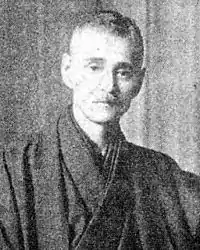Suiin Emi
Suiin Emi (江見 水蔭, Emi Suiin, 17 September 1869 – 3 November 1934), born Tadanori Emi (江見 忠功, Emi Tadanori), was a Japanese novelist and journalist.
Suiin Emi | |
|---|---|
 Suiin Emi. | |
| Born | Tadanori Emi 17 September 1869 Okayama, Japan |
| Died | 3 November 1934 (aged 65) Matsuyama, Japan |
| Occupation | Novelist, journalist |
| Genre | Novels, short stories |
| Notable works | Nyōbō-goroshi Chitei Tanken-ki |
Born in Okayama into a shizoku (former samurai) family,[1] he travelled to Tokyo to join the army but instead joined the Kenyūsha literary society and quickly became celebrated during the Sino-Japanese War for his patriotic stories in the newspaper Chūō Shinbun.[2]
A pillar of the Meiji-era literary establishment, and the editor of Kobe Shinbun and Taiheiyo[3] as well as Senshibankō[4] and Kozakuraodoshi,[1] his writing is marred for modern readers by its imperialist outlook, one example being Osero, a new version of Othello commissioned for the Otojiro Kawakami troupe and set in the Taiwan of 1903, in which the Othello figure, the governor Lt. Gen. Muro Washirō, is a Japanese burakumin who has been sent to the island to suppress a rebellion.[5]
He was the first to refer to sumo as the national sport (kokugi), inspiring the name of the Ryōgoku Kokugikan stadium built in 1909.[6] He died in Matsuyama.
Notes
- Henshall, p. 21
- James L. Huffman. Creating a public: people and press in Meiji Japan. University of Hawaii Press, 1997. Page 211.
- Who's who in Japan. Volume 22, 1941.
- Levy, p. 204
- Levy, p. 209
- "Kokugikan celebrates 100th anniversary." Yomiuri Shimbun. 7 June 2009.
Bibliography
- Kenneth G. Henshall (ed.), Tayama Katai. Literary life in Tōkyō, 1885-1915: Tayama Katai's memoirs "Thirty years in Tōkyō." Brill Archive, 1987.
- Indra A. Levy. Sirens of the Western shore: the westernesque femme fatale, translation, and vernacular style in modern Japanese literature. Columbia University Press, 2006.